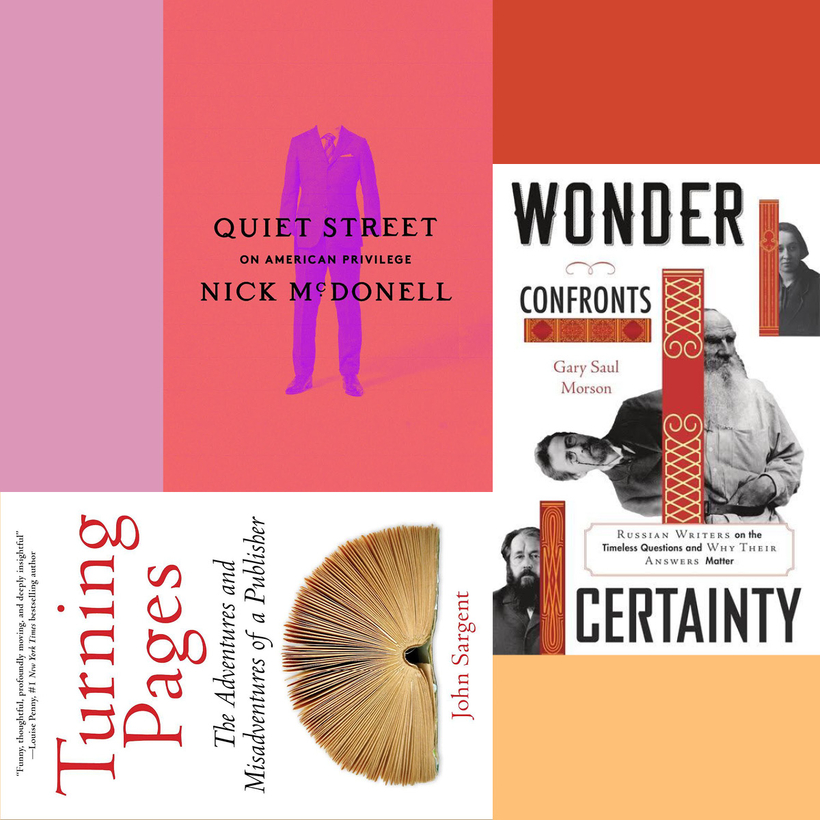The author is an accomplished novelist, a foreign correspondent, and, more to the point for the sake of this book, a son of privileged parents. (His father is rather accomplished himself, a storied magazine editor, poet, and the author of two fine memoirs.) This is Nick McDonell’s exploration of privilege and what it means both to be part of the 1 percent and, just as critically, to be part of the other 99 percent and how the system works to keep the offspring in their respective slots.
He evacuates his own past, growing up on the Upper East Side of Manhattan, attending the elite private school Buckley and then Harvard before writing his first novel (a best-seller, of course) at age 17, and eventually heading to Iraq and Afghanistan as a war correspondent. Not exactly the path chosen by his peers, and he examines his life; the lives of his Buckley classmates and their thoughts on race, wealth, and power; and the lives of those less privileged whom he befriends along the way. He discovered, among other things, that wealth defined the selves of those who had it, and that the prospect of losing one’s riches meant the prospect of losing one’s identity.
A journalist who wrote about meritocracy once observed that the more successful the people he interviewed, the more he found that they believed fervently that they lived in a meritocracy. In delicate, persuasive, and beautiful prose, McDonell blows the notion of meritocracy sky-high.
Why is it that the great Russian writers—Tolstoy, Dostoyevsky, Chekhov—engage in questions about good and evil in ways that are unmatched anywhere else? Gary Saul Morson dissects that question with an intelligence that meets the task, explaining that there really is something in the water (read that as Russian culture and history) that prompts such passionate soul-searching.
Without the bloodshed and cruelty that has so marked Russian history, could these writers have produced what they did? And why do so many of the great Russian novels, what Henry James called “large loose baggy monsters,” triumph despite what one might consider their authors’ indifference to pleasing the reader? Morson brilliantly deals with the critical questions raised by Russian fiction while at the same time offering a riveting history of an empire both before and after the 1917 revolution. Wonder Confronts Certainty does not answer the question of why we are here, but like the best of Russian literature, Morson’s book frames the question persuasively.
Looking for high-class publishing gossip with a twist of wit and self-effacement? Well, you have come to the right book. John Sargent is a legend in the book business, and like all legends he had many jobs in the industry before becoming the C.E.O. of Macmillan.
He is a terrific storyteller, whether it is about dealing with Sarah Ferguson, the Duchess of York, on her first book, Budgie the Little Helicopter (don’t ask about the room-service bill on her publicity tour), or Michael Jackson (and his fears that to match Madonna’s Sex book in sales he might have to show, in his words, his “patootie”) or Monica Lewinsky (a lovely person, and not just because her book sold very well). Sargent is just as good on his battles with Amazon, the Department of Justice, and Donald Trump, but his most affecting passages are about family and life on his ranch, in Wyoming.
How much of a mensch is Sargent? This much: he even thanks the publishers who passed on his book for their “fantastic” rejection letters.
Quiet Street and Wonder Confronts Certainty are available at your local independent bookstore, on Bookshop, and on Amazon. Turning Pages will be available beginning September 19

